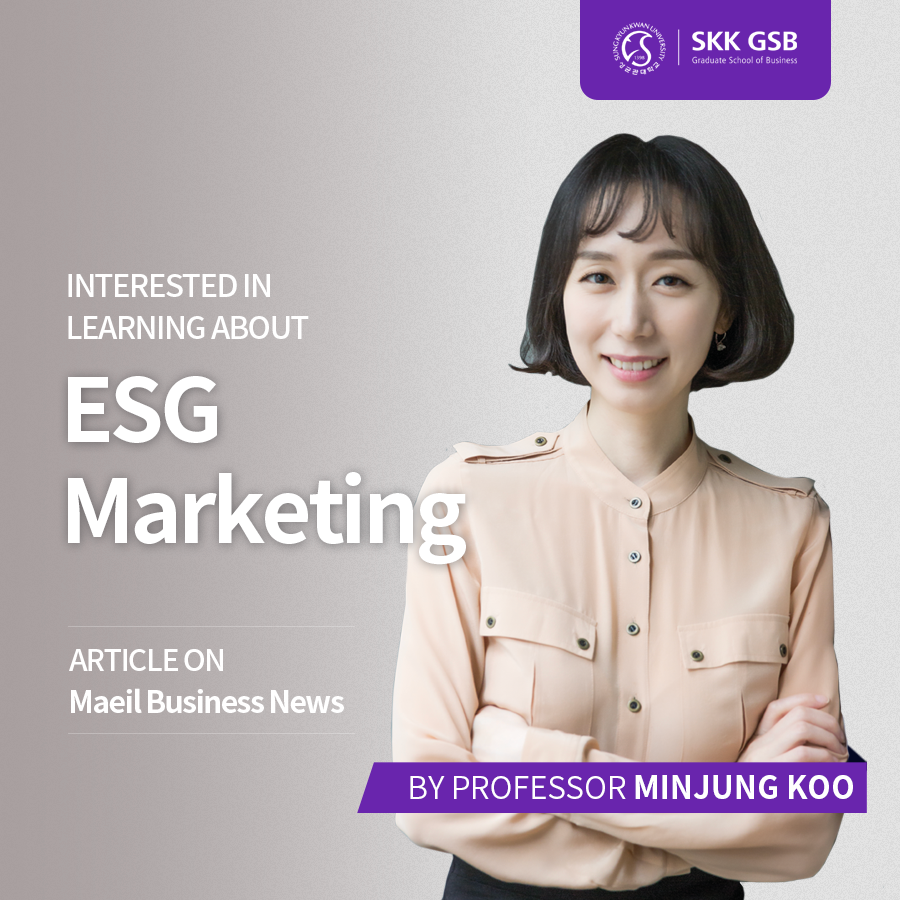[Maeil Business News] ESG Marketing
- SKKGSB
- Hit80977
- 2023-04-28
Professor Minjung Koo has written a column about ESG Marketing on MK News (Maeil Business Newspaper Korea).

"Don't buy this jacket!" This advertising phrase made the outdoor clothing brand Patagonia famous. The company, which emphasized the importance of environmental protection and sustainability by advertising with messages not to buy jackets, is considered one of the most successful cases of ESG (Environmental, Social, Governance). But can all companies become Patagonia?
ESG has been a key topic in business and investment over the past decade. Although uptake is slower in Korea than in other countries, there are also significant domestic changes. According to Google Korea (2022), the year's No. 1 search term in Korea was 'climate change.' The global agreement , which promised ESG, took effect in earnest in 2020, and pushed domestic and foreign investment institutions to follow the trend. Pace accelerated with the growing influence of Millenials and Gen Z consumers, who tend to prefer consumption with social values or particular messages.
Accordingly, SKK GSB provides various ESG classes to ensure that MBA students have sufficient knowledge and insight. Prof. Koo Min-jung's ESG marketing course is such a class. Prof. Koo has researched various marketing fields with social influence, e.g., CSR, CSV, and social marketing, for more than 15 years, she has served as an ESG management advisor for multiple organizations and companies, and she has lectured on ESG strategy to many large companies.
ESG marketing classes deal with differentiation strategies that can increase practitioners' efficacy through global examples. This is because indiscriminate copying and imitation are likely to be a waste of resources, and may be criticized by consumers. Prof. Koo argues that not all companies can become Patagonia: the core of ESG is selecting a realistic strategy that fits each company's nature and situation, and designing an ecosystem where various stakeholders can participate in the company's ESG efforts.
The mineral water industry, for example, has recently adopted a 'defensive ESG strategy' by releasing lightweight products and non-labeled bottled water to reduce plastic usage and minimize ESG-related risks. For this strategy, quiet and sporadic informative publicity is likely more effective. Since bottled water inherently causes environmental pollution, Patagonia-style active promotion of ESG efforts or branding products as green may cause unintended consequences. If ESG is given top priority without appropriate ESG capabilities, then this may not only waste resources but also increase expectations for the company's ESG performance, leading to adverse effects.
Ryu In-sul, who has been working at POSCO since graduating from a full-time MBA course, recalls the case of Fiji Water, which he learned in this class. Fiji Water, famous for its premium bottled water, experienced a fall in the image and a plunge in sales due to the direct impact of the anti-bottleneck movement in Europe. In response, it runs an aggressive campaign called Carbon Negative, aiming to reduce the amount of carbon. Although the attempt to protect the environment was commendable, consumers criticized the campaign, labeling it greenwashing. Since bottled water remains poor for the environment, Fiji Water's active ESG strategy worsened the situation, and they suffered severe damage to their reputation and brand value. This is why not all companies can, and not all companies should, be Patagonia, at least immediately. According to Mr. Ryu, "This lesson taught us strategies to help companies cope with social problems and improve brand value. The class has given us an important insight to use in various business decision-making processes."
Original article in Korean https://www.mk.co.kr/news/special-edition/10721107










